Terry Odell's Blog, page 265
December 8, 2011
More About Prologues
Monday's discussion of prologues was definitely a lively one, as was Tuesday's discussion about getting out of the box over at Jenny Milchman's blog. Thanks to all who chimed in.
Don't forget - leave a comment on Tuesday's post by Mel Teschco and be entered in a drawing for a copy of her book. You have until Friday. Scroll down. Now!
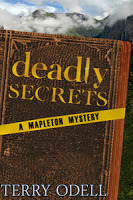 Allison Brennan's comment about her "rules" for prologues piqued my interest, and I went back and looked at the one I wrote for DEADLY SECRETS.
Allison Brennan's comment about her "rules" for prologues piqued my interest, and I went back and looked at the one I wrote for DEADLY SECRETS.
I'm copying her response here (with the understanding that she says she's broken all of them for the sake of the individual book):
1) Prologues should be short. I prefer 3-6 pages, but I have written a 15 page prologue.
2) Prologues should happen more than a week before the story begins, and preferably long before with one of the major characters that shows or explains their motivation or conflict, but I've had one that happened immediately before (24 hours) and I'm sure there's one or two from a secondary character's POV.
3) Prologues should hint to something important in the story, preferably a clue or give the reader insight into the character that they couldn't otherwise have in the first 100 pages, that is important for them understanding or enjoying the book.
So, here's my question for you. Does my prologue for DEADLY SECRETS work for you? I'd say it met with Allison's guidelines (Chapter 1 begins 5 years later).
Click to read it, and I'd love to get your take.
"You have a visitor. A gentleman. Would you like to meet in the sunroom?"
The old man shook his head. "No," he said, perhaps a little too harshly. He gave a mental shrug. What did it matter? If nothing else, being old and dying excused all sorts of rudeness. "Here is fine." He managed a weak smile.
This nurse's aide was nice, not like the regular nursing staff—fat old battleaxes who acted like you should be grateful they bothered to check on you at all. Or pinched old biddies who seemed barely able to carry a food tray. The young ones were sweet, but they burned out fast. A wave of pain snaked through him, and he wondered if he'd be gone before she quit.
She plumped his pillow and raised his bed. "I'll be back in a jiffy."
She returned a moment later, escorting his guest. After pulling a chair closer to the bed, she flashed a sunshine-bright smile. "Ring if you need anything."
His visitor waited until she left, then closed the door behind her. He introduced himself, handed over a business card. The old man couldn't read the card without his glasses, but he knew the name that would be printed there. And the voice.
Reversing the chair, his visitor straddled it and folded his arms across the vinyl back. "Good news. I found him."
The old man whirred his bed up straighter. After three years of searching, could it be possible? His heart fluttered. "You're certain?"
He studied his visitor. They'd never met face to face. The man appeared older than he'd sounded on the phone. Craggy face, broad nose. A fringe of gray hair circled a freckled pate. The odor of stale tobacco hung like an invisible cloak. The old man inhaled the long-denied pleasure of a smoke.
The visitor nodded. "I've got the address right here." He patted the chest of his baggy tweed sport jacket. "You have the money?"
"You'll get it. But—no offense. I'd like to see some ID."
The visitor shrugged. "No problem." He hoisted a hip and dug a wallet from his pocket.
The old man fumbled through his bedside table clutter for his glasses. Tucking them over his ears, he squinted at the driver's license the man held. "Very good. If you wouldn't mind, there's some stationery in the desk drawer."
His visitor brought the paper, with an envelope and pen as well. Without asking, he sat in the chair in front of the television and picked up the remote.
The old man moved the bed table and tilted it to a comfortable writing angle. He'd written the missive countless times in his head, but had never committed it to paper. Too many snooping eyes.
Frustrated that his hand shook, he concentrated on keeping the writing legible. Twice, he tore the paper into small bits and started again. To the annoying background noise of channel surfing, the old man managed to finish his letter. He folded it in thirds, slid it into the envelope and licked the seal. After taking a sip of water to wash the glue taste from his mouth, he tapped the envelope on the table to get his visitor's attention.
"I need the address," the old man said.
"The money?"
"Like I said, you'll get it." He tore a clean sheet of paper in half, wrote a note, folded it in two, and scrawled a name and address on the reverse. Handing it to the man, he said, "Give this to Phil. He'll get you the cash."
The visitor frowned, but they'd already discussed it. This damn nursing home demanded all his monetary assets. He'd managed to stash some cash before he'd moved in—for personal emergencies.
His visitor took a paper from inside his jacket. "Here it is. Took some doing, I tell you. Mapleton, Colorado is a one-horse town."
Hands trembling from more than infirmity, the old man addressed the envelope. Should he call? An ache that had nothing to do with the cancer filled him. What could he possibly say?
"There are stamps in the desk."
The visitor took the envelope and stuck a stamp on it. "Nice doing business with you."
"Wait. One more thing. When you get the cash, Phil will give you a small package. Mail it to the address you found for me. There will be enough money to cover your fee and the postage."
"Guess I can do that."
"You'll mail the letter right away?"
"Of course." The visitor slipped it into his jacket, tossed the remote onto the bed, and left.
The old man, filmed in a cold, clammy sweat, heart pounding, sank against the pillows. He thought about ringing the call button. No, not now. The nurse would come in with more drugs. He needed to think.
(And if your appetite is whetted for more, you can buy DEADLY SECRETS for only $2.99. Click here for links.)
Tomorrow: Project Feeder Watch
Like this post? Please share by clicking one of the links below.
Don't forget - leave a comment on Tuesday's post by Mel Teschco and be entered in a drawing for a copy of her book. You have until Friday. Scroll down. Now!
 Allison Brennan's comment about her "rules" for prologues piqued my interest, and I went back and looked at the one I wrote for DEADLY SECRETS.
Allison Brennan's comment about her "rules" for prologues piqued my interest, and I went back and looked at the one I wrote for DEADLY SECRETS.I'm copying her response here (with the understanding that she says she's broken all of them for the sake of the individual book):
1) Prologues should be short. I prefer 3-6 pages, but I have written a 15 page prologue.
2) Prologues should happen more than a week before the story begins, and preferably long before with one of the major characters that shows or explains their motivation or conflict, but I've had one that happened immediately before (24 hours) and I'm sure there's one or two from a secondary character's POV.
3) Prologues should hint to something important in the story, preferably a clue or give the reader insight into the character that they couldn't otherwise have in the first 100 pages, that is important for them understanding or enjoying the book.
So, here's my question for you. Does my prologue for DEADLY SECRETS work for you? I'd say it met with Allison's guidelines (Chapter 1 begins 5 years later).
Click to read it, and I'd love to get your take.
"You have a visitor. A gentleman. Would you like to meet in the sunroom?"
The old man shook his head. "No," he said, perhaps a little too harshly. He gave a mental shrug. What did it matter? If nothing else, being old and dying excused all sorts of rudeness. "Here is fine." He managed a weak smile.
This nurse's aide was nice, not like the regular nursing staff—fat old battleaxes who acted like you should be grateful they bothered to check on you at all. Or pinched old biddies who seemed barely able to carry a food tray. The young ones were sweet, but they burned out fast. A wave of pain snaked through him, and he wondered if he'd be gone before she quit.
She plumped his pillow and raised his bed. "I'll be back in a jiffy."
She returned a moment later, escorting his guest. After pulling a chair closer to the bed, she flashed a sunshine-bright smile. "Ring if you need anything."
His visitor waited until she left, then closed the door behind her. He introduced himself, handed over a business card. The old man couldn't read the card without his glasses, but he knew the name that would be printed there. And the voice.
Reversing the chair, his visitor straddled it and folded his arms across the vinyl back. "Good news. I found him."
The old man whirred his bed up straighter. After three years of searching, could it be possible? His heart fluttered. "You're certain?"
He studied his visitor. They'd never met face to face. The man appeared older than he'd sounded on the phone. Craggy face, broad nose. A fringe of gray hair circled a freckled pate. The odor of stale tobacco hung like an invisible cloak. The old man inhaled the long-denied pleasure of a smoke.
The visitor nodded. "I've got the address right here." He patted the chest of his baggy tweed sport jacket. "You have the money?"
"You'll get it. But—no offense. I'd like to see some ID."
The visitor shrugged. "No problem." He hoisted a hip and dug a wallet from his pocket.
The old man fumbled through his bedside table clutter for his glasses. Tucking them over his ears, he squinted at the driver's license the man held. "Very good. If you wouldn't mind, there's some stationery in the desk drawer."
His visitor brought the paper, with an envelope and pen as well. Without asking, he sat in the chair in front of the television and picked up the remote.
The old man moved the bed table and tilted it to a comfortable writing angle. He'd written the missive countless times in his head, but had never committed it to paper. Too many snooping eyes.
Frustrated that his hand shook, he concentrated on keeping the writing legible. Twice, he tore the paper into small bits and started again. To the annoying background noise of channel surfing, the old man managed to finish his letter. He folded it in thirds, slid it into the envelope and licked the seal. After taking a sip of water to wash the glue taste from his mouth, he tapped the envelope on the table to get his visitor's attention.
"I need the address," the old man said.
"The money?"
"Like I said, you'll get it." He tore a clean sheet of paper in half, wrote a note, folded it in two, and scrawled a name and address on the reverse. Handing it to the man, he said, "Give this to Phil. He'll get you the cash."
The visitor frowned, but they'd already discussed it. This damn nursing home demanded all his monetary assets. He'd managed to stash some cash before he'd moved in—for personal emergencies.
His visitor took a paper from inside his jacket. "Here it is. Took some doing, I tell you. Mapleton, Colorado is a one-horse town."
Hands trembling from more than infirmity, the old man addressed the envelope. Should he call? An ache that had nothing to do with the cancer filled him. What could he possibly say?
"There are stamps in the desk."
The visitor took the envelope and stuck a stamp on it. "Nice doing business with you."
"Wait. One more thing. When you get the cash, Phil will give you a small package. Mail it to the address you found for me. There will be enough money to cover your fee and the postage."
"Guess I can do that."
"You'll mail the letter right away?"
"Of course." The visitor slipped it into his jacket, tossed the remote onto the bed, and left.
The old man, filmed in a cold, clammy sweat, heart pounding, sank against the pillows. He thought about ringing the call button. No, not now. The nurse would come in with more drugs. He needed to think.
(And if your appetite is whetted for more, you can buy DEADLY SECRETS for only $2.99. Click here for links.)
Tomorrow: Project Feeder Watch
Like this post? Please share by clicking one of the links below.
Published on December 08, 2011 04:00
December 7, 2011
What's Cooking Wednesday - Easy Apricot Chicken
First, a thank you to Mel for taking us to Australia yesterday.
Next, congratulations to Karin Anderson who was the winner of Giveaway #3. I'll have another drawing as soon as I get to 20 new newsletter subscribers. Sign up at my website.
And thanks to author and frequent visitor to Terry's Place, Elizabeth Spann Craig, for today's recipe. I think I've got this one buried in my own recipe files. Thanks for sharing, Elizabeth, and now I'm going to have to make this one myself.
Apricot Chicken

12 chicken thighs (I used chicken breasts—about 1 1/2 pounds)
1 cup apricot preserves (can use whole cranberry sauce instead, if you like)
1 cup French dressing
1 package dry onion soup mix
pineapple chunks (optional)
Preheat oven to 350.
Combine the preserves, French dressing, and dry soup mix in a bowl.
Put the chicken in a 9 x 13 baking dish and cover with apricot mixture.
Cook uncovered for 50 minutes. Add pineapple chunks (if you like) and cook for 10 more minutes.
Elizabeth's latest book Hickory Smoked Homicide released November 1. Elizabeth writes the Memphis Barbeque series for Penguin/Berkley (as Riley Adams), the Southern Quilting mysteries (2012) for Penguin/NAL, and the Myrtle Clover series for Midnight Ink. She blogs daily at Mystery Writing is Murder
Like this post? Please share by clicking one of the links below.
Next, congratulations to Karin Anderson who was the winner of Giveaway #3. I'll have another drawing as soon as I get to 20 new newsletter subscribers. Sign up at my website.
And thanks to author and frequent visitor to Terry's Place, Elizabeth Spann Craig, for today's recipe. I think I've got this one buried in my own recipe files. Thanks for sharing, Elizabeth, and now I'm going to have to make this one myself.
Apricot Chicken

12 chicken thighs (I used chicken breasts—about 1 1/2 pounds)
1 cup apricot preserves (can use whole cranberry sauce instead, if you like)
1 cup French dressing
1 package dry onion soup mix
pineapple chunks (optional)
Preheat oven to 350.
Combine the preserves, French dressing, and dry soup mix in a bowl.
Put the chicken in a 9 x 13 baking dish and cover with apricot mixture.
Cook uncovered for 50 minutes. Add pineapple chunks (if you like) and cook for 10 more minutes.
Elizabeth's latest book Hickory Smoked Homicide released November 1. Elizabeth writes the Memphis Barbeque series for Penguin/Berkley (as Riley Adams), the Southern Quilting mysteries (2012) for Penguin/NAL, and the Myrtle Clover series for Midnight Ink. She blogs daily at Mystery Writing is Murder
Like this post? Please share by clicking one of the links below.
Published on December 07, 2011 04:00
December 6, 2011
An Australian Trip
I'm pleased to welcome Mel Teshco to Terry's Place. Mel writes sizzling paranormal and contemporary erotica for Ellora's Cave and Harlequin Nocturne Bites. Stone-Cold Lover was her first book in the Winged & Dangerous series featuring gargoyle characters living in the harsh Australian environment, and she's since written 10 more books with characters from this diverse landscape. Today, she's taking us Down Under. Be sure to leave a comment, because she's giving away a book.
But before you read on, please pop over to Jenny Milchman's blog, where I'm her guest today. I'm talking about the challenges of getting out of the box. Australia won't be going anywhere while you're gone!
I've just come back from a 'trip' to my brother's cattle farm (more a hobby farm of around 220 acres) where he lives with stunning views of the surrounding hills and in relative solitude with his wife and son. In Australia, driving a full day or more to go and visit a loved one or friend isn't anything unusual. It takes around 13 hours for me to drive from the Sunshine Coast/Wide Bay in Queensland, to my brother's farm interstate, New South Wales. And I can tell you, it gives me great appreciation for the seemingly endless procession of truck drivers who drive far longer than that at any given time.
I've spent much of my life along the East coast of Australia, from the breathtaking beauty of the Buchan caves and its beautiful, rolling green hills where the winter's morning air has your breath puff out like smoke, to the eerily beautiful taipan snakes that slither through the endless sugarcane fields of Mackay and further north.
Is it any wonder I adore setting my stories in Australia? The country offers such a diverse landscape: snow, desert, beaches, rainforest, farmland and mountains, often with drought, floods and fire. Then there's its creatures – deadly snakes, dingos, kangaroos, wombats, koalas and for the paranormal lovers – bunyips and big foot. I've even used crypto zoology in my panther, shape shifter story Identity Shift.
Speaking of which, I'm offering a reader who makes a comment a copy of either my self-published story Identity Shift, or any one of my gargoyle books from the Winged & Dangerous series.
Identity Shift can be purchased from Amazon, Smashwords and AllRomance. You can track down all Mel's books at her website and blog
Like this post? Please share by clicking one of the links below.
But before you read on, please pop over to Jenny Milchman's blog, where I'm her guest today. I'm talking about the challenges of getting out of the box. Australia won't be going anywhere while you're gone!
I've just come back from a 'trip' to my brother's cattle farm (more a hobby farm of around 220 acres) where he lives with stunning views of the surrounding hills and in relative solitude with his wife and son. In Australia, driving a full day or more to go and visit a loved one or friend isn't anything unusual. It takes around 13 hours for me to drive from the Sunshine Coast/Wide Bay in Queensland, to my brother's farm interstate, New South Wales. And I can tell you, it gives me great appreciation for the seemingly endless procession of truck drivers who drive far longer than that at any given time.
I've spent much of my life along the East coast of Australia, from the breathtaking beauty of the Buchan caves and its beautiful, rolling green hills where the winter's morning air has your breath puff out like smoke, to the eerily beautiful taipan snakes that slither through the endless sugarcane fields of Mackay and further north.
Is it any wonder I adore setting my stories in Australia? The country offers such a diverse landscape: snow, desert, beaches, rainforest, farmland and mountains, often with drought, floods and fire. Then there's its creatures – deadly snakes, dingos, kangaroos, wombats, koalas and for the paranormal lovers – bunyips and big foot. I've even used crypto zoology in my panther, shape shifter story Identity Shift.
Speaking of which, I'm offering a reader who makes a comment a copy of either my self-published story Identity Shift, or any one of my gargoyle books from the Winged & Dangerous series.
Identity Shift can be purchased from Amazon, Smashwords and AllRomance. You can track down all Mel's books at her website and blog
Like this post? Please share by clicking one of the links below.
Published on December 06, 2011 05:00
December 5, 2011
Before the Beginning
What I'm reading: The Drop, by Michael Connelly
Note: Today is the LAST day to enter Giveaway #3. Check the Deals & Steals tab. Remember, you have to let me know you've entered.
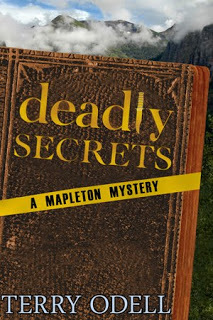 First, a brief pause for this commercial message. DEADLY SECRETS, my first non-romantic suspense novel, is now available for sale. Although it's technically an "indie" publication, there's nothing "indie" about it. I'll talk more about that another time. Today, it's prologues.
First, a brief pause for this commercial message. DEADLY SECRETS, my first non-romantic suspense novel, is now available for sale. Although it's technically an "indie" publication, there's nothing "indie" about it. I'll talk more about that another time. Today, it's prologues.
When I was starting to learn the craft of writing (not really all that long ago), I noted that many speakers, be they authors, agents, or editors, spoke about prologues. As with everything else, opinions varied. Some agents said, "When I ask for your first five (or ten) pages, don't send me your prologue; I want to see Chapter 1, which is where your book really starts." Others wanted to see the prologue.
There was the question of what determines a prologue in the first place. If it's showing action that begins shortly before your Chapter 1, then it should BE Chapter 1.
Then there's the question, "Is it needed at all?" Could that information be woven in as back story. Are the prologue characters going to appear in the book?
And lastly, came the guideline I tended to follow. Prologues in romance used to be the norm (along with epilogues, but that's another topic). However, they were falling out of favor, and the recommendation was to avoid them.
Not being fond of prologues myself, I liked the last one, and didn't include prologues to any of my romantic suspense books. I used the "trickle the information in later" method. I did write a prologue for Finding Sarah—more as a way to get to know her back story than to add to the book. I never submitted it with the manuscript, and you can find it in "Finding Fire" where I collected several stories and vignettes I wrote about Randy and Sarah, simply because I wanted to know more about them.
But now, I've published DEADLY SECRETS. It's a mystery. Prologues in mysteries are still common. Often they show the murder, or reveal something about the victim. In many cases, this is information the reader is privy to, but the detective isn't. I did think the book needed a prologue, to set the foundation for a theme of the book. I did follow the, "It happens years before the book opens" guideline, so I felt comfortable calling it a prologue instead of Chapter 1.
Does everyone read prologues? No, not always. Will the book stand if they don't? With DEADLY SECRETS, think it will, although there are definitely clues dropped in there, and my feeling is that since I took the time and effort to write the words, I hope readers will read ALL of them.
DEADLY SECRETS is available at just about all the e-bookstores. I published it directly to Amazon for Kindle readers, and to Barnes & Noble for those with Nooks. I've published it at Smashwords, which provides formats for just about any e-reading device. Eventually, they send it to some of the other stores such as Sony, but that takes several weeks, but you can still download a format that fits most devices.
And, one of the 'perks' to readers is that they can download samples. So, if you want to read the prologue, you can do it for free. All the links for finding the book are on my website here.
What's your take on prologues? Do you read them? Skip them? Like them? Do you like them in one genre, but not another?
Tomorrow my guest, Mel Teshco, is taking us Down Under. Don't miss it.
Like this post? Please share by clicking one of the links below.[image error]
Note: Today is the LAST day to enter Giveaway #3. Check the Deals & Steals tab. Remember, you have to let me know you've entered.
 First, a brief pause for this commercial message. DEADLY SECRETS, my first non-romantic suspense novel, is now available for sale. Although it's technically an "indie" publication, there's nothing "indie" about it. I'll talk more about that another time. Today, it's prologues.
First, a brief pause for this commercial message. DEADLY SECRETS, my first non-romantic suspense novel, is now available for sale. Although it's technically an "indie" publication, there's nothing "indie" about it. I'll talk more about that another time. Today, it's prologues.When I was starting to learn the craft of writing (not really all that long ago), I noted that many speakers, be they authors, agents, or editors, spoke about prologues. As with everything else, opinions varied. Some agents said, "When I ask for your first five (or ten) pages, don't send me your prologue; I want to see Chapter 1, which is where your book really starts." Others wanted to see the prologue.
There was the question of what determines a prologue in the first place. If it's showing action that begins shortly before your Chapter 1, then it should BE Chapter 1.
Then there's the question, "Is it needed at all?" Could that information be woven in as back story. Are the prologue characters going to appear in the book?
And lastly, came the guideline I tended to follow. Prologues in romance used to be the norm (along with epilogues, but that's another topic). However, they were falling out of favor, and the recommendation was to avoid them.
Not being fond of prologues myself, I liked the last one, and didn't include prologues to any of my romantic suspense books. I used the "trickle the information in later" method. I did write a prologue for Finding Sarah—more as a way to get to know her back story than to add to the book. I never submitted it with the manuscript, and you can find it in "Finding Fire" where I collected several stories and vignettes I wrote about Randy and Sarah, simply because I wanted to know more about them.
But now, I've published DEADLY SECRETS. It's a mystery. Prologues in mysteries are still common. Often they show the murder, or reveal something about the victim. In many cases, this is information the reader is privy to, but the detective isn't. I did think the book needed a prologue, to set the foundation for a theme of the book. I did follow the, "It happens years before the book opens" guideline, so I felt comfortable calling it a prologue instead of Chapter 1.
Does everyone read prologues? No, not always. Will the book stand if they don't? With DEADLY SECRETS, think it will, although there are definitely clues dropped in there, and my feeling is that since I took the time and effort to write the words, I hope readers will read ALL of them.
DEADLY SECRETS is available at just about all the e-bookstores. I published it directly to Amazon for Kindle readers, and to Barnes & Noble for those with Nooks. I've published it at Smashwords, which provides formats for just about any e-reading device. Eventually, they send it to some of the other stores such as Sony, but that takes several weeks, but you can still download a format that fits most devices.
And, one of the 'perks' to readers is that they can download samples. So, if you want to read the prologue, you can do it for free. All the links for finding the book are on my website here.
What's your take on prologues? Do you read them? Skip them? Like them? Do you like them in one genre, but not another?
Tomorrow my guest, Mel Teshco, is taking us Down Under. Don't miss it.
Like this post? Please share by clicking one of the links below.[image error]
Published on December 05, 2011 04:00
December 3, 2011
Weekend Updates
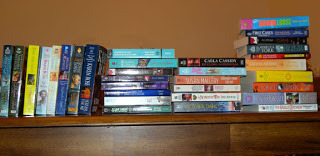 1. A reminder: Giveaway #3 is underway, and if you want some books, you need to enter by Monday, December 5th. Details at the Deals & Steals tab.
1. A reminder: Giveaway #3 is underway, and if you want some books, you need to enter by Monday, December 5th. Details at the Deals & Steals tab.2. Don't forget to sign up for my newsletter. I'm waiting until I hit 20 new followers, and then I'll have even more books to give away.
3. My overall giveaway is still going on. Remember, you get an entry for following the blog, "Liking" the blog, signing up for my newsletter, sending me a recipe or pictures for a Friday Field Trip. That means you can have up to 5 chances to win a big batch of books.
4. Guest Blogging.
I'm ready to open the first quarter of 2012 (January, February, March) to guests. Guests don't have to be published authors, or even writers—I'd love to have readers leave posts as well.
The basic "rules"
1. No religion
2. No politics
3. No BSP (blatant self-promotion)
If you'd like a slot, please email me for the official guidelines at blog @ terryodell.com (remove spaces)
Like this post? Please share by clicking one of the links below.[image error]
Published on December 03, 2011 04:00
December 2, 2011
Friday Field Trip - Desert Rest Stops
Although we split our drive to Tempe, Arizona into two days, we didn't stop much along the way for photos. And most of the "good" spots in places where it was impossible to stop. Maybe next time...






Like this post? Please share by clicking one of the links below.[image error]






Like this post? Please share by clicking one of the links below.[image error]
Published on December 02, 2011 04:00
December 1, 2011
Marketing Recap
What I'm reading: Seal of my Dreams, by too many authors to list here.
And Giveaway #3 is underway, so be sure you enter. Check the Deals & Steals tab for how. Deadline to enter: Monday, Dec. 5th.
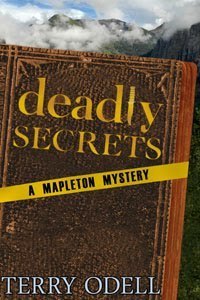 I've been working on final edits for my mystery, DEADLY SECRETS, working with the cover artist to finalize the cover (what do you think?), and still trying to follow my own advice from Monday's post and move forward on the WIP.
I've been working on final edits for my mystery, DEADLY SECRETS, working with the cover artist to finalize the cover (what do you think?), and still trying to follow my own advice from Monday's post and move forward on the WIP.
And then there's the marketing side of writing as well. In keeping with my honest sharing of what's going on with writing, I thought I'd give a short recap of my Thanksgiving weekend sale promotion.
Rather than bruise my ego too badly, I'll chalk up the lower than expected number of requests for the free books to the fact that many people were involved with holiday travel, family, and other real life chores.
Because my sales of my Pine Hills Police books were low, my goal was to lift FINDING SARAH, and hopefully, the rest of the Pine Hills Police books to a more visible spot in the Amazon rankings. To do this, I gave copies of the book to anyone who requested one. This means I paid for the book rather than offer a Smashwords coupon. However, I know there are a lot of people out there who don't own Kindles (myself included), so I DID offer a free coupon on Smashwords. These don't cost me anything, but they don't move the book up in rankings.
 Now, the Amazon algorithms have a lot of variable, but a simplified explanation of how things work (which is all I can understand) is that book sales are calculated, compared with others, and it's all about the timing. If 25 people buy the book in a short period of time, rankings jump.
Now, the Amazon algorithms have a lot of variable, but a simplified explanation of how things work (which is all I can understand) is that book sales are calculated, compared with others, and it's all about the timing. If 25 people buy the book in a short period of time, rankings jump.
What I learned: the sale of the book doesn't get recorded until the gift recipient buys it. So, even though I bought a number of books in a short period of time, my rankings weren't affected until the recipient downloaded them. Since the downloads trickled in over the duration of the sale, I didn't get the spike I'd hoped for. Yes, the rankings made a very nice upward movement (from about 204,000 to about 15,000) but the book never cracked the top 100 in romantic suspense. And they're going down again, albeit more slowly.
Sales didn't move across the board. As a matter of fact, I had the lowest sales for all my books over that timeframe (again, could have been the holiday, as they're now creeping back to normal).
Some Observations:
People don't read directions. Although I told people to let me know which format they wanted, about 1/3 of them neglected this step, adding an extra step to the process.
People don't understand e-books and downloading, but still want a free book even though they have no clue what to do with it. One tried to change his order to the print version (which wasn't even in the offer) because he didn't have an e-reader.
People think "Kindle" is the generic term for e-readers. One emailed me to tell me she tried in vain to get her book loaded onto her Sony.
Was it worth it? Yes. True, there's more labor involved in sending out gifts, but I did meet some new readers, and revisited some familiar names. Some offered to write reviews. And I'll be watching sales to see if there's an uptick in sales of the sequel, HIDDEN FIRE, as well as the rest of my books. Because, bottom line, that's what we're marketing. Not a single book, but our name, and ultimately, we hope readers will buy a book because they know what kind of a read they'll be getting. When I was Googling for images, I came across this slogan, and I think it holds true: Selling is Marketing, but Marketing is not Selling.
Tomorrow, for my Friday Field Trip, we'll be on the road to and from Tempe, Arizona.
Like this post? Please share by clicking one of the links below.
And Giveaway #3 is underway, so be sure you enter. Check the Deals & Steals tab for how. Deadline to enter: Monday, Dec. 5th.
 I've been working on final edits for my mystery, DEADLY SECRETS, working with the cover artist to finalize the cover (what do you think?), and still trying to follow my own advice from Monday's post and move forward on the WIP.
I've been working on final edits for my mystery, DEADLY SECRETS, working with the cover artist to finalize the cover (what do you think?), and still trying to follow my own advice from Monday's post and move forward on the WIP.And then there's the marketing side of writing as well. In keeping with my honest sharing of what's going on with writing, I thought I'd give a short recap of my Thanksgiving weekend sale promotion.
Rather than bruise my ego too badly, I'll chalk up the lower than expected number of requests for the free books to the fact that many people were involved with holiday travel, family, and other real life chores.
Because my sales of my Pine Hills Police books were low, my goal was to lift FINDING SARAH, and hopefully, the rest of the Pine Hills Police books to a more visible spot in the Amazon rankings. To do this, I gave copies of the book to anyone who requested one. This means I paid for the book rather than offer a Smashwords coupon. However, I know there are a lot of people out there who don't own Kindles (myself included), so I DID offer a free coupon on Smashwords. These don't cost me anything, but they don't move the book up in rankings.
 Now, the Amazon algorithms have a lot of variable, but a simplified explanation of how things work (which is all I can understand) is that book sales are calculated, compared with others, and it's all about the timing. If 25 people buy the book in a short period of time, rankings jump.
Now, the Amazon algorithms have a lot of variable, but a simplified explanation of how things work (which is all I can understand) is that book sales are calculated, compared with others, and it's all about the timing. If 25 people buy the book in a short period of time, rankings jump.What I learned: the sale of the book doesn't get recorded until the gift recipient buys it. So, even though I bought a number of books in a short period of time, my rankings weren't affected until the recipient downloaded them. Since the downloads trickled in over the duration of the sale, I didn't get the spike I'd hoped for. Yes, the rankings made a very nice upward movement (from about 204,000 to about 15,000) but the book never cracked the top 100 in romantic suspense. And they're going down again, albeit more slowly.
Sales didn't move across the board. As a matter of fact, I had the lowest sales for all my books over that timeframe (again, could have been the holiday, as they're now creeping back to normal).
Some Observations:
People don't read directions. Although I told people to let me know which format they wanted, about 1/3 of them neglected this step, adding an extra step to the process.
People don't understand e-books and downloading, but still want a free book even though they have no clue what to do with it. One tried to change his order to the print version (which wasn't even in the offer) because he didn't have an e-reader.
People think "Kindle" is the generic term for e-readers. One emailed me to tell me she tried in vain to get her book loaded onto her Sony.
Was it worth it? Yes. True, there's more labor involved in sending out gifts, but I did meet some new readers, and revisited some familiar names. Some offered to write reviews. And I'll be watching sales to see if there's an uptick in sales of the sequel, HIDDEN FIRE, as well as the rest of my books. Because, bottom line, that's what we're marketing. Not a single book, but our name, and ultimately, we hope readers will buy a book because they know what kind of a read they'll be getting. When I was Googling for images, I came across this slogan, and I think it holds true: Selling is Marketing, but Marketing is not Selling.
Tomorrow, for my Friday Field Trip, we'll be on the road to and from Tempe, Arizona.
Like this post? Please share by clicking one of the links below.
Published on December 01, 2011 04:00
November 30, 2011
What's Cooking Wednesday - Company Green Beans
Thanks to Jenny for her encouragement yesterday. I think we all found some inspiration there.
I discovered this recipe from my mom when I was going through some files. She called it "Company String Beans" because she made it when she had dinner guests, or had to bring a veggie side dish. It makes a nice alternative to the classic green beans/mushroom soup/fried onion rings standard, and it's what I made for Thanksgiving this year.
Company String Beans
3 pkg. French cut green beans, cooked & drained.
2 T butter
2 T flour
1 t salt
1 t sugar
1 t pepper
½ onion, grated
½ lb. Swiss cheese, grated
1 c. sour cream
Corn flakes
Butter
Melt butter. Stir in flour, salt, sugar, pepper & onion. Cook for a few minutes to get rid of any 'raw flour' taste. Gradually add sour cream.

Fold in cooked green beans.

Put in a greased casserole. Sprinkle with cheese, then corn flakes. Dot with butter. Bake at 400 for 20 minutes.

And, as always, variations work fine. I can imagine this would be good with broccoli, too. Or another kind of cheese. Have fun.
Like this post? Please share by clicking one of the links below.
I discovered this recipe from my mom when I was going through some files. She called it "Company String Beans" because she made it when she had dinner guests, or had to bring a veggie side dish. It makes a nice alternative to the classic green beans/mushroom soup/fried onion rings standard, and it's what I made for Thanksgiving this year.
Company String Beans
3 pkg. French cut green beans, cooked & drained.
2 T butter
2 T flour
1 t salt
1 t sugar
1 t pepper
½ onion, grated
½ lb. Swiss cheese, grated
1 c. sour cream
Corn flakes
Butter
Melt butter. Stir in flour, salt, sugar, pepper & onion. Cook for a few minutes to get rid of any 'raw flour' taste. Gradually add sour cream.

Fold in cooked green beans.

Put in a greased casserole. Sprinkle with cheese, then corn flakes. Dot with butter. Bake at 400 for 20 minutes.

And, as always, variations work fine. I can imagine this would be good with broccoli, too. Or another kind of cheese. Have fun.
Like this post? Please share by clicking one of the links below.
Published on November 30, 2011 04:00
November 29, 2011
Stick-to-it-iveness
Today my guest is Jenny Milchman.Jenny is the founder of Take Your Child to a Bookstore Day, and the Made It Moments forum on her blog. She teaches writing and publishing for New York Writers Workshop, as well as online, and has designed curricula to teach writing to children.I'm pleased to welcome her to Terry's Place.
I thought I'd talk today about perseverance.
They say success in this business is 1% talent and 99% perseverance, so it must be pretty important stuff.
But what is perseverance? The dictionary defines it as: "Steadfastness in doing something despite difficulty or delay in achieving success."
That definition pretty much sums up my own journey to publication. It took me almost eleven years to sell my "first" novel. And my first was really my eighth. Along the way, I was lucky enough to have three terrific agents, and fifteen editors who wanted to make offers on one or the other of five novels submitted.
Whenever I reveal these numbers, I get met with a range of responses. Some writers don't want to hear them. And I don't blame them a bit. Writing even one novel is hard. Really hard. During that process, the prospect of doing it again, and again, and again and again and again (you get the idea), before ever getting published is not a pleasant one.
I felt the same way. When I had just finished my first novel and was sending out queries to agents, my mom had one of those mother-is-always-right moments, though neither of us knew it then.
"I think you're going to make it," she said. "You've been a storyteller from the time you could talk. You have stories in your soul." (I may be making my mom a tad more poetic than she was). "But I think it will take a long time," she went on. "Whoopi Goldberg says every overnight sensation is ten years in the making."
Well, I'm not a sensation, but my mom was only off by a few months.
Other writers hear those numbers and seem to relate. They say things like, "It took me nine years," or, "My tenth novel is the one that sold."
Now the publishing world has changed, of course. You no longer have to follow the traditional path to publication, which does tend to take a chunk of time and a closetful of manuscripts, except possibly for a few lucky writers.
But I still think perseverance is just as key.
It takes perseverance to write a novel. And to perfect it. Whether published by a major house, a smaller one, or independently, the author may come to realize that his or her first novel shouldn't be the one to come out. We all have manuscripts in a drawer, and those stories took a bit of life blood as they were written.
Whichever novel does come out, it takes perseverance to market it and build a readership.
Perseverance to sit back down in that chair and start all over again, when the possibility of success—success being typing those two words, the and end—is far from certain.
So how do we acquire that persistence? What separates the talented writers who stop writing from the talented ones who don't?
I think that the writers who wind up doing this seriously—whether that means making money at it, or continuing to produce story after story that gets better and better—are able to block out almost everything I've said in this post, lost in their own fictive dream.
The power of that story is so fierce that it needs to come out, and then it needs to find readers.
Perseverance will come—if you are meant to be doing this, it will find you. Perseverance is the gift that accompanies a story that needs to be told.
For more about Jenny, visit her website . Her debut novel, COVER OF SNOW, will be published by Ballantine in early 2013.
Like this post? Please share by clicking one of the links below.
I thought I'd talk today about perseverance.
They say success in this business is 1% talent and 99% perseverance, so it must be pretty important stuff.
But what is perseverance? The dictionary defines it as: "Steadfastness in doing something despite difficulty or delay in achieving success."
That definition pretty much sums up my own journey to publication. It took me almost eleven years to sell my "first" novel. And my first was really my eighth. Along the way, I was lucky enough to have three terrific agents, and fifteen editors who wanted to make offers on one or the other of five novels submitted.
Whenever I reveal these numbers, I get met with a range of responses. Some writers don't want to hear them. And I don't blame them a bit. Writing even one novel is hard. Really hard. During that process, the prospect of doing it again, and again, and again and again and again (you get the idea), before ever getting published is not a pleasant one.
I felt the same way. When I had just finished my first novel and was sending out queries to agents, my mom had one of those mother-is-always-right moments, though neither of us knew it then.
"I think you're going to make it," she said. "You've been a storyteller from the time you could talk. You have stories in your soul." (I may be making my mom a tad more poetic than she was). "But I think it will take a long time," she went on. "Whoopi Goldberg says every overnight sensation is ten years in the making."
Well, I'm not a sensation, but my mom was only off by a few months.
Other writers hear those numbers and seem to relate. They say things like, "It took me nine years," or, "My tenth novel is the one that sold."
Now the publishing world has changed, of course. You no longer have to follow the traditional path to publication, which does tend to take a chunk of time and a closetful of manuscripts, except possibly for a few lucky writers.
But I still think perseverance is just as key.
It takes perseverance to write a novel. And to perfect it. Whether published by a major house, a smaller one, or independently, the author may come to realize that his or her first novel shouldn't be the one to come out. We all have manuscripts in a drawer, and those stories took a bit of life blood as they were written.
Whichever novel does come out, it takes perseverance to market it and build a readership.
Perseverance to sit back down in that chair and start all over again, when the possibility of success—success being typing those two words, the and end—is far from certain.
So how do we acquire that persistence? What separates the talented writers who stop writing from the talented ones who don't?
I think that the writers who wind up doing this seriously—whether that means making money at it, or continuing to produce story after story that gets better and better—are able to block out almost everything I've said in this post, lost in their own fictive dream.
The power of that story is so fierce that it needs to come out, and then it needs to find readers.
Perseverance will come—if you are meant to be doing this, it will find you. Perseverance is the gift that accompanies a story that needs to be told.
For more about Jenny, visit her website . Her debut novel, COVER OF SNOW, will be published by Ballantine in early 2013.
Like this post? Please share by clicking one of the links below.
Published on November 29, 2011 05:00
November 28, 2011
Tips For Finding Your Groove
What I'm reading: The Fifth Witness, by Michael Connelly
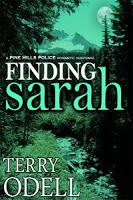
First, today is the last day to request a copy of FINDING SARAH. If you want a copy, email me at bookstore @ terryodell (dot) com with Thanksgiving in the header, and tell me whether you want a Smashwords coupon or a Kindle gift. This is NOT a contest. Everyone who asks can have a download. My only 'catch' is that you download the books when you get your email, since this giveaway ends today. If you want to preview the book, you can find the first chapter on my website.
And pop into the Deals & Steals tab to see how you can enter my contests.
As faithful readers of this blog might know, lately I've had little time to work on the WIP. I was sidetracked by edits for DEADLY SECRETS, my upcoming mystery. One daughter came to the states from Northern Ireland to visit. Hubster and son had birthdays. Our other daughter competed in the Iron Man in Arizona, which meant two driving days each way plus the event itself. Then came Thanksgiving.
Since I'm not under a deadline, I didn't even try to move forward on the WIP. Didn't even have my laptop. But now that I'm home, our daughters are back to their own homes, and the laundry is done, it's time to get back to work.
How to deal with lapses in writing time? I'm sure everyone has his or her own system, but the following works for me. Your approach will differ, depending on your own writing system.

1. Get rid of chores that will nag.
If you are going to worry about cleaning house, paying bills, going through email, take the time to get the critical things dealt with. Otherwise you're not going to be focused on your writing.
2. Do critiques for my crit group.
This might seem counterproductive, but freeing your brain from your own plot issues and looking at someone else's writing can help get your brain into thinking about the craft itself.
3. Deal with critique group feedback.
Normally, I'm about 4 or 5 chapters ahead of my subs to my crit group. If I start with their feedback on earlier chapters, I get back into the story, but more critically than if I simply read the chapters. And they might point out plot holes that need to be dealt with. Fixing these issues helps bring me up to speed on where I've been. It also gets me back into the heads of my characters (which can be very important if I've been dealing with edits on another manuscript, with entirely different characters).
4. Read the last chapter I wrote.
Do basic edits, looking for overused words, typos, continuity errors. This is another way to start thinking "writing" and this time it's giving you that running start for picking up where you left off.
5. If needed, update my tracking board.
This forces me to summarize the last chapter/scene and gets me looking at the bigger picture.
6. Consult any plot notes I have.
For me, it's my idea board, since I don't outline. And, odds are, you've been thinking about your book--maybe even jotting down notes--while you've been away.
7. Figure out the plot points for the next scene.
Once you know what has to happen, based on the previous step, you have a starting point.
8. Write.
And don't worry if things don't flow immediately. Get something on the page. Fix it later.
Tomorrow my guest is Jenny Milchman, who's a great supporter of writers with her "Made it Moment" blog. She's talking about perseverance.
Like this post? Please share by clicking one of the links below.

First, today is the last day to request a copy of FINDING SARAH. If you want a copy, email me at bookstore @ terryodell (dot) com with Thanksgiving in the header, and tell me whether you want a Smashwords coupon or a Kindle gift. This is NOT a contest. Everyone who asks can have a download. My only 'catch' is that you download the books when you get your email, since this giveaway ends today. If you want to preview the book, you can find the first chapter on my website.
And pop into the Deals & Steals tab to see how you can enter my contests.
As faithful readers of this blog might know, lately I've had little time to work on the WIP. I was sidetracked by edits for DEADLY SECRETS, my upcoming mystery. One daughter came to the states from Northern Ireland to visit. Hubster and son had birthdays. Our other daughter competed in the Iron Man in Arizona, which meant two driving days each way plus the event itself. Then came Thanksgiving.
Since I'm not under a deadline, I didn't even try to move forward on the WIP. Didn't even have my laptop. But now that I'm home, our daughters are back to their own homes, and the laundry is done, it's time to get back to work.
How to deal with lapses in writing time? I'm sure everyone has his or her own system, but the following works for me. Your approach will differ, depending on your own writing system.

1. Get rid of chores that will nag.
If you are going to worry about cleaning house, paying bills, going through email, take the time to get the critical things dealt with. Otherwise you're not going to be focused on your writing.
2. Do critiques for my crit group.
This might seem counterproductive, but freeing your brain from your own plot issues and looking at someone else's writing can help get your brain into thinking about the craft itself.
3. Deal with critique group feedback.
Normally, I'm about 4 or 5 chapters ahead of my subs to my crit group. If I start with their feedback on earlier chapters, I get back into the story, but more critically than if I simply read the chapters. And they might point out plot holes that need to be dealt with. Fixing these issues helps bring me up to speed on where I've been. It also gets me back into the heads of my characters (which can be very important if I've been dealing with edits on another manuscript, with entirely different characters).
4. Read the last chapter I wrote.
Do basic edits, looking for overused words, typos, continuity errors. This is another way to start thinking "writing" and this time it's giving you that running start for picking up where you left off.
5. If needed, update my tracking board.
This forces me to summarize the last chapter/scene and gets me looking at the bigger picture.
6. Consult any plot notes I have.
For me, it's my idea board, since I don't outline. And, odds are, you've been thinking about your book--maybe even jotting down notes--while you've been away.
7. Figure out the plot points for the next scene.
Once you know what has to happen, based on the previous step, you have a starting point.
8. Write.
And don't worry if things don't flow immediately. Get something on the page. Fix it later.
Tomorrow my guest is Jenny Milchman, who's a great supporter of writers with her "Made it Moment" blog. She's talking about perseverance.
Like this post? Please share by clicking one of the links below.
Published on November 28, 2011 04:00



